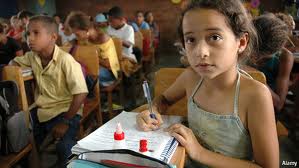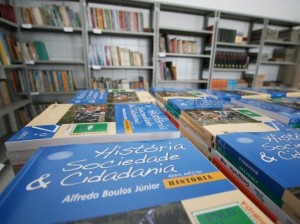Brazil is a country that thrives off agriculture and one that is filled with beaches and metropolitan cities. Due to the country’s diversity and economic success, Brazil has become a place that attracts many tourists and a place that successful businessmen call home. Brazil has made great strides to become what it is to today due to the emphasis on agriculture and industrialization during colonization.
Despite these accomplishments, nestled in the center of Brazil you will find “Wilma Flor” a public elementary school located in one of Brazil’s poorest neighborhood where a large number of students will not make it to primary school.This school reflects the majority of public schools throughout the nation. Today in Brazil you can see how philosophical and cultural influences during colonization have greatly influenced Brazil’s economic success as well as the quality and disparities in education.
The history of education in Brazil began in the 16th century, when Jesuits arrived. The Jesuits who regularly created missions to Brazil, educated the indigenous people through the teachings of Christianity. For next 210 years, the Jesuits were completely responsible for the entire education system, implementing primary and secondary schools throughout Brazil. In 1759, the Jesuits were expelled from Brazil upon the arrival of Marquis of Pombal, Portugal’s minister. The interest in Christian education conflicted with Marquis’s commercial interest. Under Pombal’s reign a large number of African slaves along with local Indians were employed in produce agriculture products and extract gold and diamonds. Because of Pombal’s emphasis on agriculture production, Brazil’s education stagnated. This marks the beginning of the problems that exist in Brazil’s education system today.
In 1808, the Portuguese royal family escaped the invasion of Napoleon’s troop and transferred their kingdom to Brazil. Education in Brazil began to move again. Under King Joao VI rule, the first library opened along with a number of schools and scientific institutions. Despite the undeniable educational achievements of King Joao VI, his policies mainly focused on higher-education neglecting the needs of a primary education among the Brazilian population.
In 1822 after the country’s independence from Brazil, a primary education became a human right. The constitution of 1864 guaranteed education for all, but that’s not the end. In 1834 an act was created that gave power to the provinces to legislate education. The lack of governmental influence and the lack of interest in primary education resulted in a great social and educational divide between the lower and upper class population. Only the upper-middle class could afford to get an adequate education in private schools.
In 1920, the first official university was founded. In the following decades education policies began to acknowledge the relevance of accelerating the process of urbanization and industrialization. A primary education finally was of importance. Government policy makers to this day are vigorously working on expanding and improving Brazil’s education system.
Even though Brazil has made great strides to improve the education system over the years the education gap still exists to this day and it’s most evident in Brazil’s poorest neighborhoods. Even though education has become more assessable in those neighborhoods the quality of education has dramatically dropped. A typical day in a Brazilian public school consist of 5 hours of instructional time where as in a private school students receive an average of 8. Currently 83 percent of the middle class population still attends private schools. A “quality” education is still for the elite.
The disinterest in primary education in Brazil from the colonial times makes education in Brazil fairly new compared to other developed countries. Recent data indicates about half of all 1st graders fail which causes 2.3 percent of them to abandon school and this number reaches to 32 percent by the end of fourth-grade. Agriculture and industrialization is still flourishing in Brazil to this day, it is not common to see a child drop out of school to work for their family making education a second priority as did Pombal in 1759.
With a booming industrial and agricultural industry and a lack of an adequate educational system we can see that work is still a priority, it has even become a culture. 2.8 million Brazilians receive professional education that specifically treats the needs the local and regional markets. 24% percent of courses offered in professional schools are industrial, followed by agriculture and commerce. The National Commercial Training Service is one example of a professional school with aims of developing skills and creating qualified individuals for the labor market.
With that said, you can see Brazil’s culture is dominated by the service, agricultural and industrial sectors. As Brazil economy booms and more jobs open up, the standing issue of education will eventually have an effect on the economy. Many major organizations based in Brazil such as Odebrecht, a construction company, are not finding enough qualified Brazilians and are having to outsource to fill their positions. Pombal’s philosophy on work during colonization has changed and evolved over time. The notion that a good education results to prosperity and wealth is changing the way Brazil view’s education. Even though there is still a lot of work to be done, the education system in Brazil is progressing by emphasizing a good education leads to a prosperous future.
Fun video to watch-.ENJOY!







0 comments ↓
There are no comments yet...Kick things off by filling out the form below..